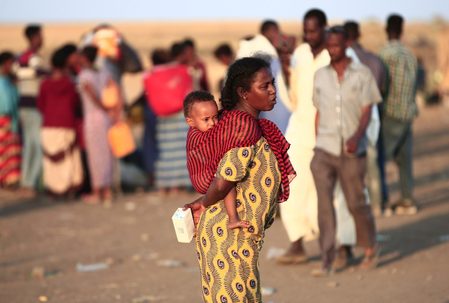SUMMARY
This is AI generated summarization, which may have errors. For context, always refer to the full article.

The first international aid convoy arrived on Saturday, December 12, in the capital of Ethiopia’s Tigray region since fighting broke out more than a month ago, triggering a refugee crisis and humanitarian disaster.
The International Committee of the Red Cross said 7 trucks brought medicines and medical equipment for 400 wounded as well as relief supplies to Mekele, a city of half a million which had been all-but cut off to foreign aid since the conflict began on November 4.
“It is the first international aid to arrive in Mekele since fighting erupted in Tigray more than one month ago,” the Geneva-based ICRC said, describing health care facilities in the city as “paralyzed.”
Patrick Youssef, ICRC regional director for Africa, said the supplies would “reduce those impossible life-or-death triage decisions” for doctors and nurses in Mekele who had endured for weeks without running water and electricity, let alone essential medicines.
The convoy arrived as the United Nations expressed growing alarm over the plight of nearly 100,000 Eritrean refugees in Tigray and appealed for urgent access to assist them and 600,000 others who were dependent on food rations before the conflict even began.
Ethiopia had restricted access to Tigray, and a communications blackout has made it difficult to evaluate the true extent of the humanitarian situation on the ground. But aid groups have been warning for weeks of a looming hunger crisis as food rations dwindled, and efforts to send life-saving relief were repeatedly delayed.
Disturbing reports
Prime Minister Abiy Ahmed, the winner of last year’s Nobel Peace Prize, on Friday said his government would be in charge of handling the humanitarian response and access to Tigray, and that Ethiopia had this week dispatched tons of food and other relief supplies by trucks to Mekele and other cities in the region.
Ethiopia has bridled at suggestions that outsiders might play a leading role in the relief effort and an agreement last week to allow the UN and aid agencies access to Tigray foundered, deepening international alarm, before another deal was announced on Wednesday.
The UN refugee agency UNHCR said Friday it still has not been able to reach 4 camps housing nearly 100,000 Eritreans since the announcement of a major military offensive by Ethiopia’s army against forces loyal to Tigray’s dissident ruling party more than a month ago.
Filippo Grandi, the UN High Commissioner for Refugees, said the UNHCR had received “an overwhelming number of disturbing reports” of refugees being killed or kidnapped and forcibly returned to Eritrea, which borders Tigray to the north.
“If confirmed, these actions would constitute a major violation of international law,” Grandi said.
“I am strongly urging the government of Ethiopia to continue to uphold their responsibility towards refugees under international law, and to ensure the protection and safety of all refugees in the country.”
The International Rescue Committee said Friday one of its staff was killed last month at a refugee camp for Eritreans in Tigray. The Danish Refugee Council, which also assists the Eritreans, said three of its guards were killed, but did not specify where.
‘Harm and hunger’
Ethiopia said Friday it was returning “misinformed” Eritrean refugees making their way south to Addis Ababa back to the camps in Tigray to receive aid and live “lawfully and peacefully.”
“Forcibly sending Eritrean refugees back to camps in Tigray places them at unnecessary risk of harm and hunger,” Laetitia Bader, Horn of Africa director for Human Rights Watch, said Saturday.
“Eritrean refugees shouldn’t be forced to be in a conflict zone where humanitarian assistance is still restricted and international access to the refugee camps still cut off.”
The UN migration agency IOM on Friday denied that its buses were used to transport refugees “to an unknown destination” and rejected allegations that Eritreans were being held at one of its transit centers in Addis Ababa and processed for forcible return.
The International Organization for Migration said it was “extremely concerned” by reports of Eritreans being relocated against their will and “does not under any circumstances conduct the forced return of migrants and refugees.”
It said one of its 3 transit centers in Addis Ababa was “taken over” by Ethiopian authorities on December 3 and that IOM “had no management authority, oversight or involvement in any activities undertaken by the authorities in the center since that time.”
In a sign of the depth of tensions over where and how aid agencies should operate in Tigray, a UN team trying to visit a camp for Eritrean refugees on December 6 was shot at by Ethiopian forces and briefly detained.
Abiy declared the fighting in Tigray over on November 28, saying the army had captured Mekele from forces loyal to the Tigray People’s Liberation Front (TPLF), and has dismissed reports of ongoing fighting as “sporadic gunfire” and not major combat.
Thousands have been killed, according to the International Crisis Group think tank, and around 50,000 people have fled to refugee camps across the border in Sudan. – Rappler.com
Add a comment
How does this make you feel?

There are no comments yet. Add your comment to start the conversation.